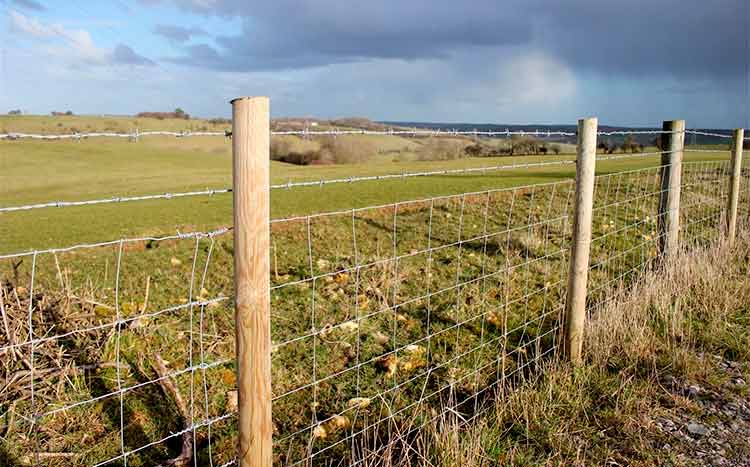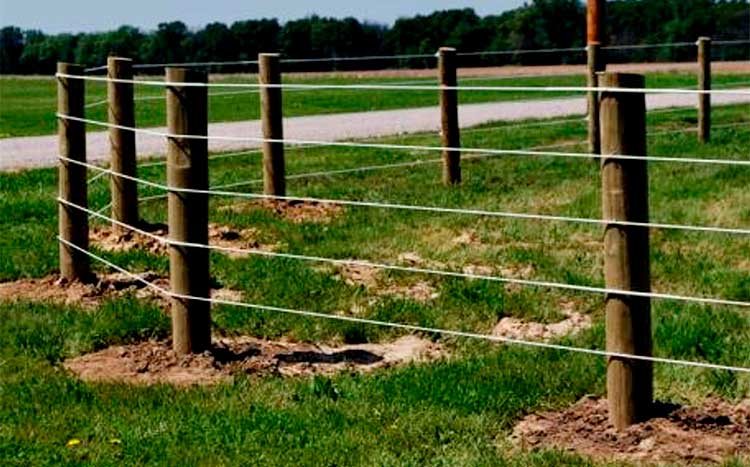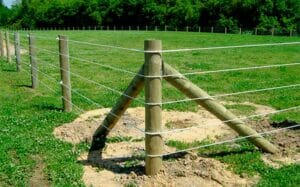The market offers a variety of agricultural fencing options, available in numerous styles and designs, each associated with a specific price.
Farm fencing costs between $2 and $20 per linear foot installed. Post and wire are the cheapest, while Post and rail are much more expensive. The average cost is $1,675 per 100 ft, while labor costs $2 and $6 per linear foot.
The installation cost of farm fencing depends on the total linear footage to be covered and the type and quality of the fence you choose. Vinyl, wooden and pipe fencing are quite costly to install but are more durable. High-tensile wire fencing is an excellent choice if you are looking for a more budget-friendly farm fencing option.
What we cover
ToggleThe average cost of farm fencing
The table below provides you with a summary of the different farm fencing types and their costs. Before you install a particular fence, consult with your professional first to know the number of lines and strands you will need for your animals’ safety and the structure’s durability. The number of lines and strands needed will depend on your livestock type.
| Material type | Price | Lifespan |
|---|---|---|
| Metal pipe | $7 - $10 per foot | 20 – 30 years |
| High-tensile Non-electric wire | $0.02 - $0.03 per ft (per strand) | 25 – 50 years |
| High-tensile electric wire | $0.03-$0.12 per strand | 25 – 30 years |
| High-tensile barbed wire | $0.03-$0.05 per strand | 20 – 30 years |
| Electric High-tensile polymer | $0.10-$0.15 per line | 25 – 30 years |
| Non-electric High-tensile polymer | $0.11-$0.13 per line | 20 – 50 years |
| High-tensile polymer rail | $0.80 - $0.90 per foot | 30 – 50 years |
| Vinyl | $8 - $20 per foot | 10 – 15 years |
| Hog, Bull, & Cattle panel | $1.25 - $2.55 per foot | 7 – 10 years |
| Wood post & board | $3 - $9 per foot | 15 – 20 years |
| Woven wire | $0.10-$0.14 per braid | 25 – 30 years |
| Tape | $0.04 - $0.30 per strand | 5 – 10 years |
| No climb | $1.40 - $1.90 per foot | 15 – 20 years |

Metal pipe fence cost
Metal pipe fencing costs between $7 and $10 per linear foot to install. This fencing type is quite expensive to install, but its durability makes it an excellent choice for livestock owners looking for a safe, strong, and durable fencing option. Metal pipe fences can, however, hurt animals that run or get pushed into it.
Pipe fences are corrosion-resistant, making them excellent for areas experiencing harsh weather.
High-tensile wire
High-tensile wire fences are excellent farm fencing options that last for many years. They are cheap to install, and their low maintenance costs make them a popular choice for most ranch owners. High-tensile wire fences come in electric and non-electric options.
Electric
A high-tensile electrified wire fence will set you back by around $0.03 to $0.12 per linear foot. It is essential to use markers or raise the bottom/lowest wire several inches from the ground to protect your animals from potential harm.
Non-electric
The high-tensile non-electric wire fence costs around $0.02 to $0.03 per linear foot to install. This cost is for one strand, so the overall cost will depend on the number of strands you want. Experts recommend six strands for optimal protection so that you will pay between $0.12 and $0.18 for this fence, not including labor costs.
However, high-tensile wire fences have low visibility, which may put your livestock at a higher risk of being injured or entangled in the wires.
High tensile barbed wire
Installing a high-tensile barbed wire fence costs between $0.03 and $0.05 for a single strand per linear foot. This fence type is inexpensive to install and will keep your animals safe and contained in your ranch. It has a rustic appearance that makes it very appealing to most homeowners.
Once you install this fence, you should watch your livestock. This is because a barbed wire fence contains sharp barbs that can tear and rip off your animals’ skin and injure them severely. This fence also requires regular tightening to keep it effective.
High tensile polymer
The high-tensile polymer fence also comes in electric and non-electric options.
Electric
Expect to pay between $0.10 and $0.15 per linear foot for one line of high-tensile polymer electrified fence. The HTTP electric fence is costlier because it takes a long time to install. More so, this fence type uses electricity, so your monthly power bills will be higher.
Non-electric
The high-tensile non-electric fence costs around $0.11 to $0.13 per linear foot for a single line. It is slightly cheaper than the electrified option and is ideal if you do not want additional power bills.
Both HTTP electric and non-electric fences are excellent choices for your livestock. This fence is safer for livestock fencing as the additional polymer prevents the fence lines from cutting and ripping off your animal’s skin. More so, the polymer is resistant to weather, impact and stretching, making it highly durable. The polymer comes in various colours to increase visibility.
High tensile polymer rail fence cost
The average cost per foot for a high-tensile polymer rail fence is between $0.80 and $0.90 per foot. This fence features three HTP steel wires that are evenly spaced. The wires can be either electrified or non-electrified. This fence is highly durable, and it does not break, split like wood fences. It is similar in appearance to the split-rail fence and can last for over 30 years.

Vinyl horse fence cost
The vinyl horse fence is another high-end farm fencing option that costs between $0.90 and $1.60 for a single rail, per linear foot. The rails come in various colours, so you can choose the colour that matches your property. This fence is one of the most expensive to install, but it can last for about 10 -15 years. It is a low maintenance fence that works perfectly in moderate climates, but a colder climate can make the PVC material brittle.
PVC fencing does not splinter like wood upon impact, making it safer and more durable. You can add one strand of electric wire on the fence to keep your livestock from leaning or popping the fence posts and rails.
Hog, Bull & cattle panel cost
Expect to pay between $1.25 and $2.55 per linear foot for hog wire fencing as well as bull and cattle panel fencing. If you wish to buy a wire panel measuring 16 feet long, you will spend about $25 to $50.
Different animals have different needs. So, the gaps at the panels’ bottom and spacing between the wires will depend on the kind of livestock you want to enclose.
Wood post & rail fencing cost
A wood post and board fence is also called a paddock, split rail or Kentucky fence. Building this fence will cost between $4 and $12 per linear foot, including the required posts and 2-4 nails.
If you wish to add a wire mesh to the fence, you will spend an additional $2.00 per linear foot. You will also need to add protective stain or paint at an extra cost.
Wood post and board fences are quite expensive to install and maintain. It is essential to maintain the fence and replace boards regularly because the wood may cause harm to your animals when it splinters.
Woven wire electrical fence cost
Installing a braided or woven wire electric fence costs around $0.10 to $0.14 for one braid, per linear foot. The actual cost of the fence will vary widely depending on the size of your farm.
Electrobraid is one of the most popular brands for woven wire electric fences. Installing this fence costs approximately $1.55 per linear foot. This fence is durable and can last for over 25 years without showing any signs of failure.
This fence offers more visibility than other types of wire fencing, and it comes in various colours and diameters.
Tape fencing cost
The average cost to install a tape fence ranges between $0.04 and $0.30 per linear foot. The cost may vary depending on the width and thickness of the tape. A tape fence is manufactured using conductive metal strands and poly fibres that are woven together. This fence is inexpensive and easy to install. It is also much wider and offers more visibility than traditional tape fencing, but it is not suitable for windy areas.
No climb fence cost
No-climb farm fencing, diamond weave or woven wire fence, costs between $1.40 and $1.90 per linear foot to install. This cost is for materials alone and can vary depending on the size of the structure. No-climb fencing is ideal for larger animals like horses because it has small openings. This fencing is suitable for even landscapes and requires regular tightening to maintain its functionality.
Livestock ranch fences (best choice)
The livestock fence you install will depend on the kind of livestock you have and your budget. Below are different types of livestock fencing and their costs.
Horse fencing
Both split rail and wire fencing are excellent options for horse fencing. The average cost to install a split rail fence costs between $12 and $30 per linear foot including labor cost. This kind of fence requires 3-4 rails and a height of 5ft to keep your horses safe and contained in your ranch. Although the split rail fence is expensive, it is the best option for safety and durability.
Wire fences are cheaper and cost around $3 to $8.50 per linear foot installed. If you are looking for a cost-effective choice, wire fences are an excellent choice. However, these fences have low visibility, which may cause injuries to animals.
Cattle fencing
If you wish to contain your cattle, HT (high-tensile) barbed wire is an excellent option. This fence is affordable as it costs between $0.03 and $8 per linear foot for a single strand and about $0.20 to $0.50 per linear foot for the recommended 5 strands. A standard HT barbed wire cattle fence will cost around $1.50 per linear foot to install.
Goats and sheep fencing
Adding a mesh screen to your wooden fence is the best way to contain your sheep and goats. This fence will keep your livestock within your farm and keep out unfriendly pests like coyotes and raccoons. This kind of fence costs around $1.80 per linear foot, not including labor costs.
Game
A woven wire fence is a perfect choice for game fencing. You can spend between $0.10 and $0.15 per linear foot for a single braid. A high structure of up to 8 feet tall can cost about $1.20 per linear foot for materials alone. This fence is meant to prevent animals such as deer from jumping and climbing over.
Field fence installation cost
The cost to install a field fence averages $2 to $6 per foot. On average, you can pay about $600 to $635 for the project, excluding materials. Most livestock owners spend around $500 to $800 for the entire project, but the price depends on the type and size of the fence. To correctly estimate the project cost, consider factors such as your labor charges in your region and additional structures like gates and accessibility.
Size by foot and acre
Generally, the labor cost to install farm fencing costs between $2 and $6 per foot. So, the labor cost for one acre measuring 208 feet will be around $416 to $1,248. The exact cost for the project will vary depending on the height of the fence, the number of rails and your local labor rates. The terrain and soil type of your land will also affect the total cost of the installation.
Livestock gates cost
The average cost to install livestock gates is about $200 to $400. Livestock gates have varying lengths, from 6ft. to 16ft. These gates are designed using tubular steel welded for strength and stability. They do not sag, splinter or warp like wood. The exact price to install livestock gates will depend on their size, style and height.
DIY vs hiring a pro cost
Farm fencing installation is relatively easy, so DIYers can install it without many complications. However, this is not a job for a weekend warrior, and it can be dangerous, especially when installing electric fences. While installing the fence yourself can save you lots of cash, it is best to leave the job to professional fencing contractors.
If you plan to DIY the job, you will buy materials for around $2 to $20 per linear foot. The overall material cost will depend on the size and height of the structure. You will also need supplies and tools for the installation at an extra cost.
Hiring a professional is the best option as they will come with their materials and tools. The average cost for professional installation ranges from $4 to $26 per linear foot. Professionals are more experienced and will offer timely, high-quality and durable installations.
FAQ's
What is the cheapest type of equine fencing?
The cheapest equine fencing is wire fencing that costs as low as $0.03 per foot to install. So, if you are looking for a practical, safe and cheap livestock fencing option, consider wire fencing.
Does a chain link fence work for livestock?
Yes, a chain-link fence works excellently for livestock. It is completely safe and cannot get tangled easily, making it a perfect choice for livestock. However, it is more suitable for smaller animals such as chickens, goats and sheep as it is not sturdy enough to contain larger animals like horses. Before you install this fence type, ensure it meets your needs.
How much does it cost to fence 1/2 acre?
The cost to install farm fencing on half an acre costs around $600 to $27,000, depending on the type of material you choose. A simple wire or electric fence will cost around $600 to $3,500 to install, including labour. A composite or vinyl fence is the most expensive and will cost between $15,000 and $27,000 to install on a ½ acre.
How much does a fence cost for 1/4 acre?
Installing farm fencing on a quarter an acre will set you back by about $400 to $20,000, including labour. The actual cost depends on the type of material you choose and your yard/ranch size.













